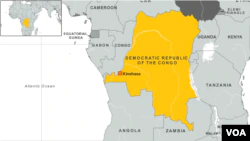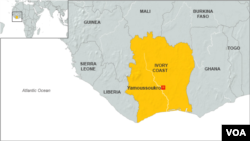Three career diplomats in the U.S. Foreign Service answered questions Wednesday from senators during a hearing examining their credentials to lead U.S. diplomatic missions in Africa. If confirmed, three of the toughest diplomatic missions abroad will be led by women, who told the lawmakers that serving on the diplomatic front lines is a privilege and that they are committed to doing what they can to further peace and prosperity in the region.
Lucy Tamlyn, who currently heads the U.S. diplomatic mission in Sudan as chargé d’affaires, may soon head south to the Democratic Republic of Congo to serve as ambassador. The DRC is the largest country, by size, in sub-Saharan Africa.
In her testimony to the Senate Foreign Relations Committee, Tamlyn described the DRC as a country of enormous size, complexity, and promise, and said “the DRC’s dynamic, entrepreneurial, and creative population of over 100 million are eager to engage with the United States.”
Senator Chris Van Hollen, a member of both Foreign Relations and the Appropriations Committee, which has authority over U.S. foreign aid, pointed to the challenges awaiting Tamlyn at the hearing.
“The DRC is an incredibly complicated place with all sorts of rivalries and conflict, especially in the East. My question for you is: what do you think is at the heart of those conflicts and what do you think you can do as U.S. ambassador to try to address them in the long-term interest of stability in the DRC?” Van Hollen, himself the son of a career U.S. Foreign Service officer, asked.
A lack of governance, coupled with the possession of vast natural resources formed the basis of some of most entrenching challenges the DRC has faced, Tamlyn said in response to Van Hollen’s question.
“There’s inevitably a competition, both inside the country as well as outside, for access to those resources. In the absence of strong government providing services to the people, you have instead a whole network of armed groups which provide some form of local governance,” a situation that poses problems, she said.
Tamlyn said it is important to communicate to the country and its people that things could change.
“We want the Congolese people to know that corrupt mineral exploitation deals, illegal logging and environmental devastation is not inevitable, and that there are alternatives,” she said.
The United States is committed to supporting governments and leaders that provide security and services to the people, she said, while vowing to use “all our diplomatic tools, including leveraging visa ineligibilities and sanctions, to help the Congolese fight corruption,” which she said was a common aspiration among the population.
The committee also heard the testimony of two other senior career diplomats nominated to head embassies in Mali and Ivory Coast, both in West Africa.
If confirmed, Jessica Davis Ba will represent the United States in Ivory Coast and Rachna Sachdeva Korhonen will lead the diplomatic mission in Mali.
The State Department currently places Mali on Level 4: Do Not Travel in its Travel Advisory. Ivory Coast and the DRC both are Level 3: Reconsider Travel.
The three senior members of the U.S. Foreign Service fully embraced the assignments awaiting them.
“If confirmed, my husband and our five sons will be going with me,” Davis Ba told the lawmakers, pointing to her husband and eldest son sitting behind her.
Korhonen, whose family emigrated to the United States from India, told the senators that in looking at her, they were looking at “an American dream come true.”
Meanwhile, Tamlyn, whose home in the eastern U.S. state of Rhode Island stands in sharp contrast with the heat in central Africa, said in her testimony that “I feel privileged to have served in countries where we are literally on the front lines, where U.S. diplomacy really matters, and side by side with colleagues who answer the call despite the personal, family, and health sacrifices entailed.”
The DRC, Mali and Ivory Coast are among “some of the most difficult ambassadorships,” former U.S. Ambassador to Chad Christopher E. Goldthwait said in a written interview with VOA.
“These are not glamour posts, but are in the forefront or representing U.S. interests on a continent that suffers from great poverty and instability, but has enormous potential and the fastest population growth on the globe.”
Representing U.S. interests in these three countries and furthering the economic and political development that is at the core of these interests will not be easy, Goldthwait said, but he had no doubt the three senior members of the U.S. Foreign Service are up to the challenge.
“It’s always encouraging to see seasoned career foreign service officers entrusted with some of the most difficult ambassadorships,” he said.



